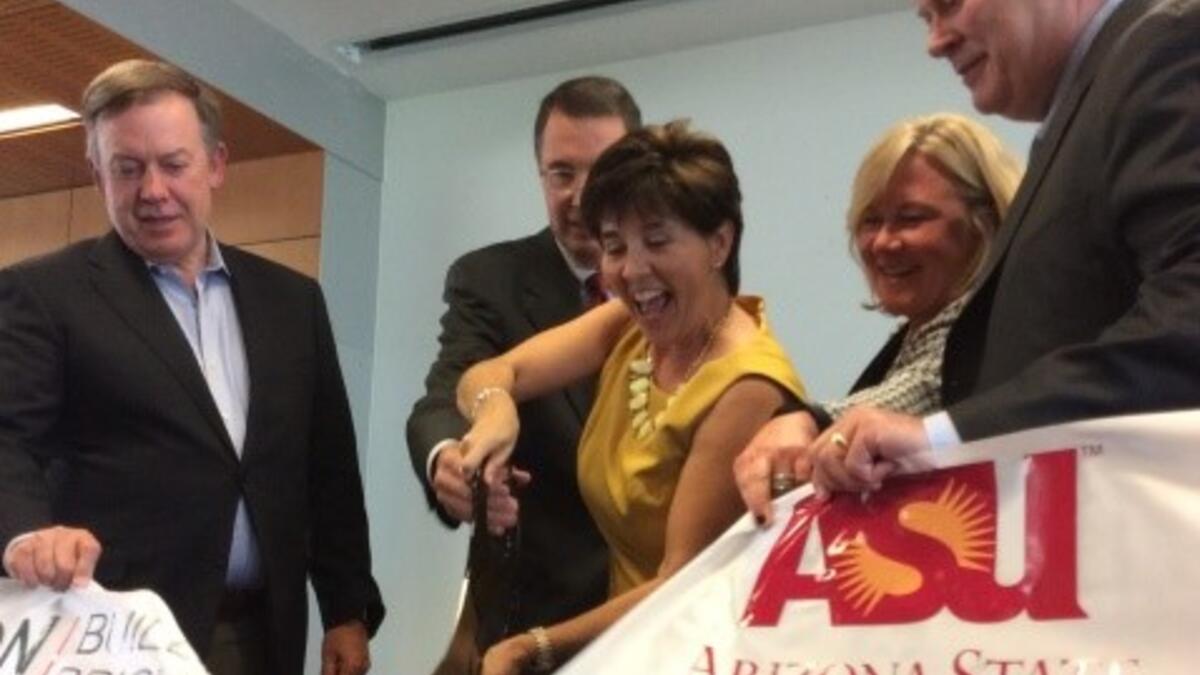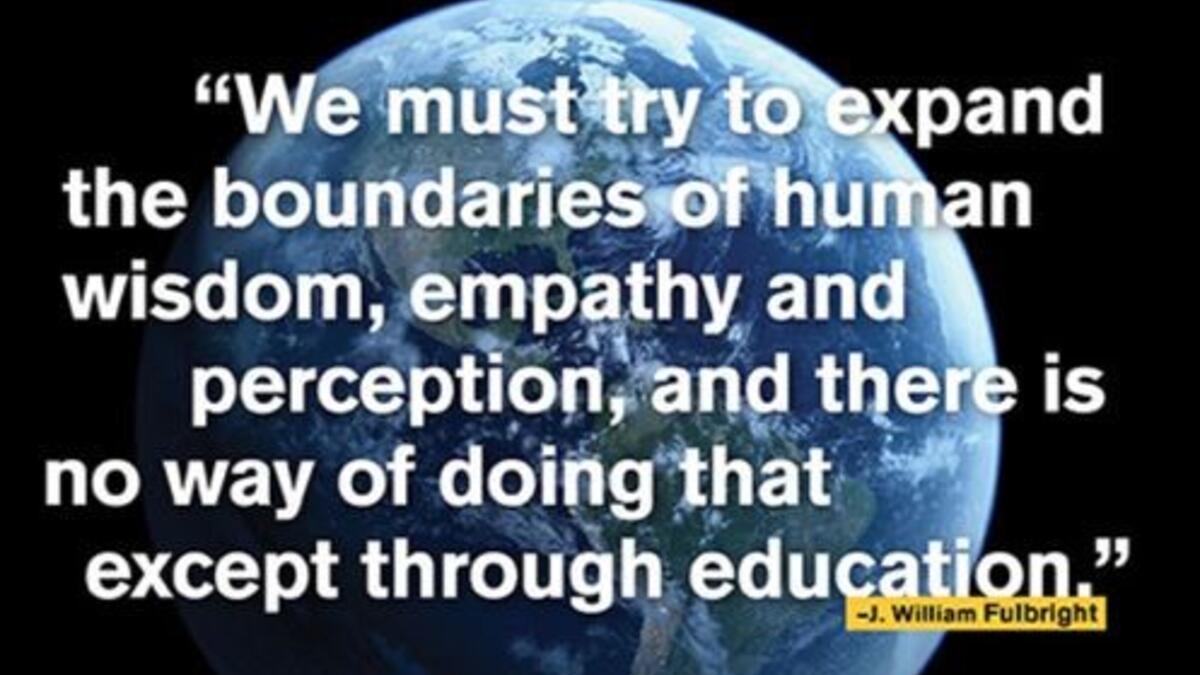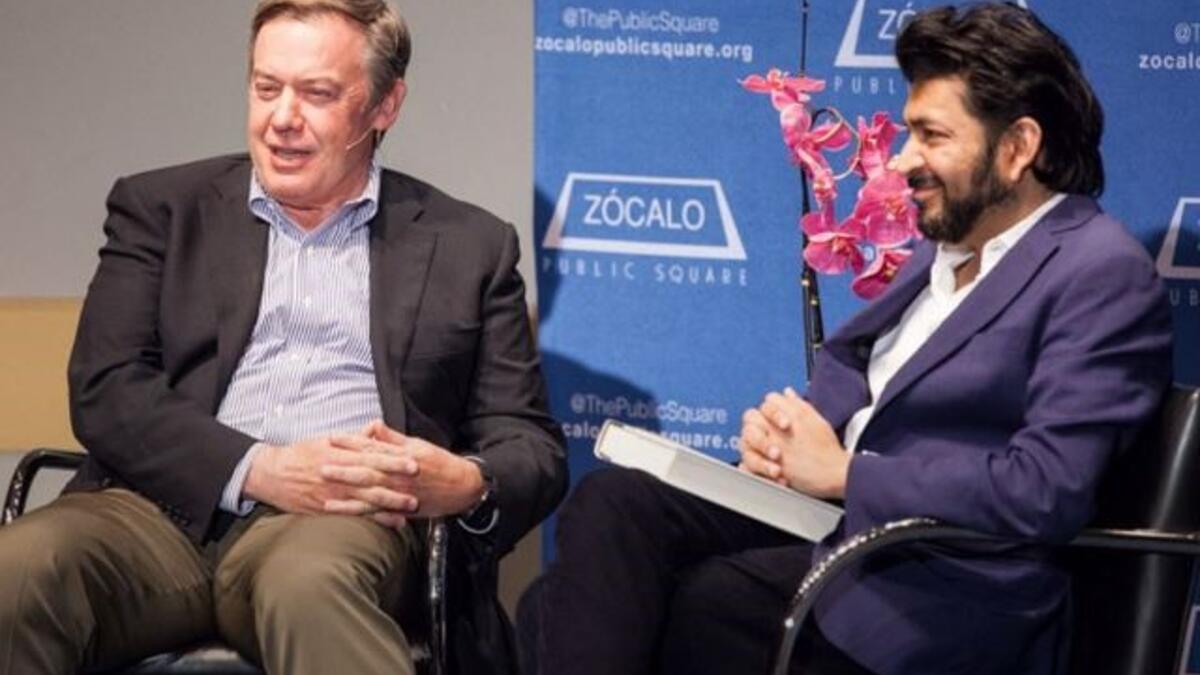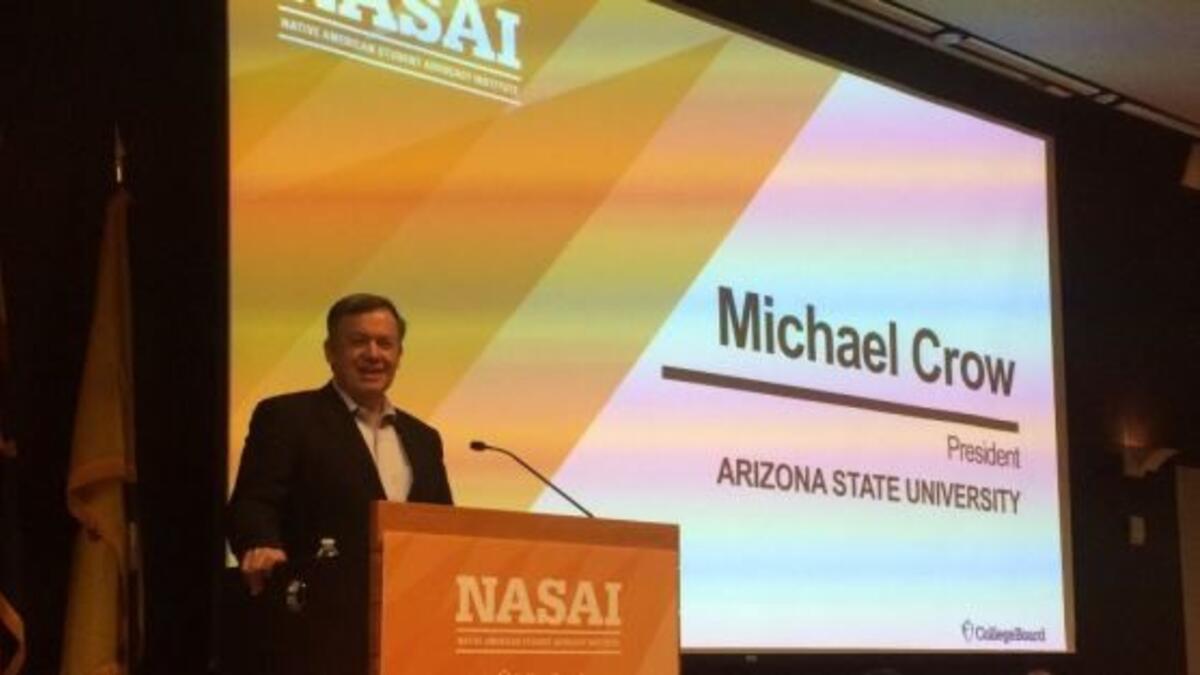
Updates from the President
Updates from President Crow: June 17, 2016
- New ASU partnership helps students pay for college
- Congratulating our award-winning ASU community
- What the heck is human anyway?
- Forging new pathways for Native American students

President Crow joins Education At Work leadership to help ASU students pay for college.
New ASU partnership helps students pay for college
No matter where I go or to whom I speak, conversations often shift to college tuition. After recent news reports of a Cappex study that cites the average student debt for college graduates as $37,000, I do not see this changing.
However, in those exchanges I am proud to share that ASU employs a moderate tuition/high-quality model designed to provide our students with a competitive, world-class education of long-term value at a cost that is less than most of ASU’s peer universities. We have also invested significantly in financial aid ($38 million in 2015) and more than 80% of all ASU students receive assistance.
People are surprised to learn that the average debt for an Arizona resident who receives a bachelor’s degree from ASU is about $22,000, almost half the national averaged cited by Cappex. In fact, 33 percent of our resident undergraduate students leave ASU with zero debt after graduation. And our quality and affordability is not going unnoticed. Kiplinger’s Personal Finance named us a “best value” college and the Wall Street Journal ranks ASU 5th among universities favored by employers for producing the best-qualified graduates. Apple, Honeywell International, Ford Motor Company, KPMG and State Farm are among the companies that put ASU at the top of their list for recruiting and hiring graduates.
As part of our ongoing efforts to improve college affordability, we recently formalized a new partnership with the non-profit Education at Work and PayPalthat will provide student employment and tuition assistance based on grades. Through this new program hundreds of ASU students will be hired for paid on-campus jobs and also become eligible to earn up to $6,000 a year in tuition assistance.
Alliances like this one and our collaboration on the Starbucks College Achievement Plan demonstrate that solutions to college affordability can be implemented, but we must stop wringing our hands and instead work together across sectors to create meaningful change. ASU is committed to cooperation that supports student success and I welcome your ideas.

Congratulating our award-winning ASU community
Summer is upon us, and even though ASU pushes forward regardless of the season, the slightly slower pace gives me time to share some of this year’s excellent achievements by our students and faculty, and to thank those whose collective efforts make these successes possible.
Not ones to rest on the laurels of our No. 1 ranking as the "Most Innovative" university in the U.S. or the unique honor of being the home of four Nobel Laureates, our ASU faculty and students continue to distinguish themselves nationally and surpass the academic accomplishments of their peers.
ASU is the top producer of Fulbright scholar faculty in the U.S. and among the very best of universities, private and public, producing Fulbright student scholars - ahead of Columbia, USC, Princeton, Georgetown, Brown, Johns Hopkins and more.
ASU is also proud to be the school of choice for Arizona's high-achieving Flinn Scholars, home to recent winners of the prestigious Goldwater and Schwarzman scholarships and delegates of the Fulbright Summer Institute, as well as the Alfred I. DuPont-Columbia Award, honoring excellence in broadcast journalism.
Achievements like these and many others occurring across ASU are a testament to our institutional commitment to excellence and to the daily, dedicated and collaborative work that is elevating ASU's legacy of education and discovery.

ASU President Michael Crow and Dr. Siddhartha Mukherjee discuss the future of genetics and what it means to be human in Los Angeles.
What the heck is human anyway?
Sometimes the end of the semester also affords new opportunities to engage with interesting thought leaders and consider where the future of teaching, learning and research may lead us.
At a special Zócalo Public Square event last month in Los Angeles, I sat down in Los Angeles with physician, scientist and Pulitzer Prize-winning author, Siddhartha Mukherjee, to discuss what society’s growing knowledge of the human genome means to the future of humanity and how it is defined. Dr. Mukherjee wrote The Emperor of All Maladies: A Biography of Cancer and more recently, The Gene: An Intimate History, and shared his thoughts on the complex formula that comprises what it means to be human, as well as the idea that the definition of a human being is ever-changing.
Our conversation also explored the history of genetics, the potential wonders of genetics related to improving human health, concerns about possible misuse, and the significant responsibilities that come with the acquisition of self-knowledge in its most minute form.
As our ASU faculty and students continue working to find answers to the world’s most complex challenges, it is a pleasure to exchange ideas and questions with great contemporary thinkers, and to gain inspiration for new endeavors.
Video of my conversation with Dr. Mukherjee and a related podcast are online.

ASU President Michael Crow addresses NASAI in the Memorial Union on the ASU Tempe campus, July 7, 2016.
Forging new pathways for Native American students
No matter the date on the calendar however, our university commitment to expand access to quality higher education never stops.
On June 7 and 8, ASU and the College Board hosted the Native American Student Advocacy Institute in Tempe. After welcoming the educators, community representatives and tribal leaders in attendance, I elaborated on ASU’s unique, simultaneous pursuit of excellence and access, as well as our responsibility to be responsive to the many communities we serve.
As an institution that has promised to reflect and embrace its cultural, socioeconomic and physical location, ASU recognizes its obligation to recruit, support, retain and graduate Native American students. In the last 10 years, through the efforts of the Office of American Indian Initiatives, American Indian Support Services and others, we have made important progress, increasing enrollment of Native American students by more than 30 percent.
Last month, nearly 400 Native students received their degrees, but this growth must continue – and rapidly – if Arizona hopes to demonstrate true leadership in college participation and degree attainment.